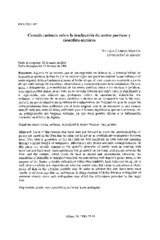Mostrar el registro sencillo del ítem
Consideraciones sobre la traducción de textos poéticos y científico-técnicos
| dc.contributor.author | Campos Martín, Natalia | |
| dc.date.accessioned | 2023-05-23T11:53:29Z | |
| dc.date.available | 2023-05-23T11:53:29Z | |
| dc.date.issued | 2008 | |
| dc.identifier.issn | 2386-9658 | |
| dc.identifier.uri | http://hdl.handle.net/10396/25372 | |
| dc.description.abstract | Algunas de las razones que se han esgrimido en defensa de la intraducibilidad de la poesía se basan en la idea de que no existen reglas que permitan realizar la equivalencia del texto original, debido fundamentalmente al hecho de que el texto construye su sentido a través de una sutil madeja de metáforas, aliteraciones y correspondencias fono-semánticas. En este artículo defendemos la especificidad de los textos poéticos frente a los técnicos o jurídicos. Esta especificidad radica, sobre todo, en la estrecha relación que existe entre el significante y el significado, una relación que podríamos definir de sacramental, indisoluble. Sin embargo, la traducción de un texto científico o técnico no es comparable con la del texto poético, ya que su objetivo no es estético sino informativo. Su finalidad no es la de buscar las correspondencias fono-estilísticas con el texto original, sino la de transmitir de una manera sencilla toda una serie de datos, utilizando para ello unos significados que sean unívocos, sin las ambigüedades del lenguaje estándar, ya que éstas pueden afectar a la información contenida en el texto de llegada. | es_ES |
| dc.description.abstract | Some of the reasons that have been put forward to show the untranslatability of poetry are based on the idea that no rules can be set up to establish the equivalence between texts. This idea is grounded on the fact that the text construes its own coherent meaning through a subtle bundle of metaphors, alliterations and phono-semantic correspondences. In this paper we provide support to the specific character of poetic texts in contrast with technical and legal texts. Such specificity lies primarily on the close relationship between the form and the content, which could be held as sacred and unbreakable. However, the translation of scientific or technical texts bear no comparison with that of a poetic texts, as the purpose of the former is mostly informative rather than aesthetic, their main aim being not to seek phono-stylistic corrrespondences with the source texts, but rather to put across a whole series of data in the simplest possible way. In order to achieve this aim those texts must handle word meanings that are univocous, in sharp contrast with the frequent ambiguities of common speech, since such ambiguities may affect the information provided by the target text. | es_ES |
| dc.format.mimetype | application/pdf | es_ES |
| dc.language.iso | spa | es_ES |
| dc.publisher | UCOPress | es_ES |
| dc.rights | https://creativecommons.org/licenses/by/3.0/ | es_ES |
| dc.source | Alfinge 20, 29-35 (2008) | es_ES |
| dc.subject | Textos poéticos | es_ES |
| dc.subject | Especificidad | es_ES |
| dc.subject | Textos técnicos | es_ES |
| dc.subject | Ambigüedad | es_ES |
| dc.subject | Poetic texts | es_ES |
| dc.subject | Specificity | es_ES |
| dc.subject | Technical texts | es_ES |
| dc.subject | Ambiguity | es_ES |
| dc.title | Consideraciones sobre la traducción de textos poéticos y científico-técnicos | es_ES |
| dc.type | info:eu-repo/semantics/article | es_ES |
| dc.relation.publisherversion | https://www.uco.es/ucopress/ojs/index.php/alfinge/index | es_ES |
| dc.rights.accessRights | info:eu-repo/semantics/openAccess | es_ES |

